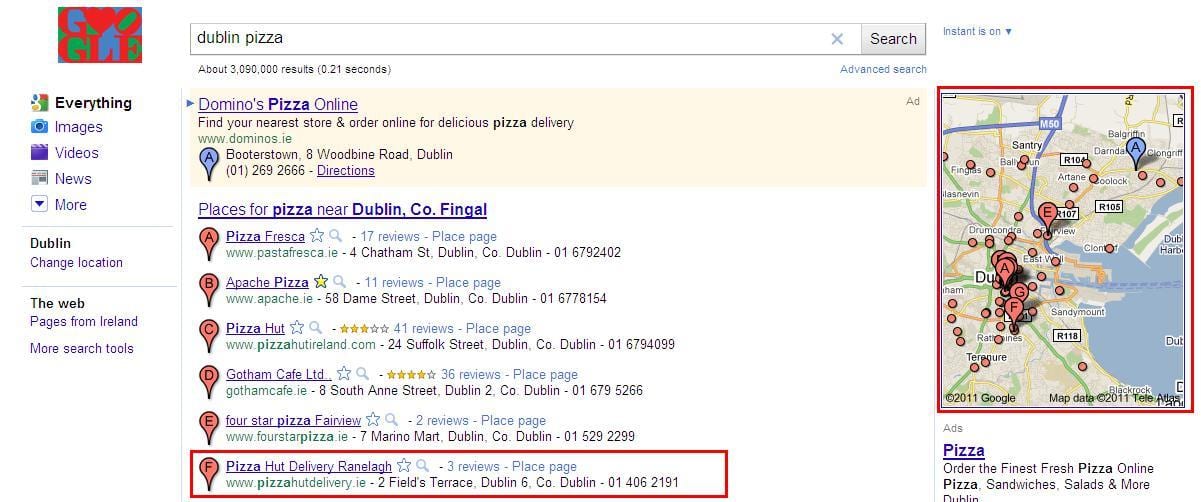According to the
What is a local search? When you enter a location specific keyword you are performing a ‘local search’. For example searching for ‘dublin pizza’ above. Many of you will have noticed that these local searches now trigger a map in search engine results from Google (Map highlighted in red above).
Note: Search queries with ‘local intent’ also appear. i.e. restaurant, pizza, butcher – by themselves can trigger the map results to appear.
This map and results are generally placed at the top of the search results. More recently Google have begun to blend the local map listings with what were traditionally the organic results (free listings). This can be seen in searches like ‘accountant dublin’ below. The local ranking factors are playing a big part in these blended results (we have highlighted the map and local listing in red below).
Google return local and mobile search results based on a different set of criteria to the traditional search results (SERPs). Effectively they use a different algorithm. Small and Local businesses can now compete for prime positions at the top of the search results without spending the large sums of money that were previously required. The key is to focus your efforts in the right areas by building up your company profile across the web. Local Search has been growing in importance for the last few years. It’s time to sit up and take notice.
Why have local searches become so important?
There are several reasons. One of the main reasons is the rise of the smart phone. There are now an estimated 1 million iPhone and Android devices in the Irish market. These people are no longer confined to their PC to perform Internet searches. These people actively search for products and services daily while on the move. What’s more these people may be very close to your physical location.
When someone searches for a ‘cork restaurant’ on their smart phone, there is a very good chance that this person is close to the centre of Cork and is likely to have lunch/ dinner in the next hour or two. If your restaurant is in position on the search results you have a decent chance of converting that searcher to a customer, if not you are ignoring a major segment of the Irish market.
What’s more, mobile searches last considerably less than their PC equivalent. So that person will make up their mind in a short space of time and may find many existing websites awkward to navigate on a mobile phone.
This is where the local listing (Google Places) comes into its own. See mobile screen shot:
Example of a local search conducted on an iphone above.
The mobile searcher is presented with Google Places page information. With the Place page you get information relevant for decision making, this being: map location, directions, click to call phone number. All of this is available in Google without ever having to enter the business website. This is hugely beneficial for mobile searchers. With one further click they can see reviews, street view images of the location and often additional images supplied by the business owner as demonstrated in the screenshots below:
Any Irish business in the retail/ hospitality trade needs to feature prominently for local searches that relate to their products and services. If you don’t feature, you are losing customers.
People searching for local business online are further along in the purchase cycle, the cost of converting each consumer is lower and the return on investment is higher. Targeting these searchers produces real results for local and multi-store retailers.
This is where Local Search becomes an essential part of your online strategy
Google Places listings are the tip of the Local Search Iceberg. They demonstrate what you can achieve by targeting local search results with Google Places. One million smart phone searchers in Ireland alone.
Local Optimisation. Local Search can also be applied to on-page optimisation for websites, including designing website alternatives for mobile searchers. Google presents different results for mobile searchers. They rank these results partially based on how well the page will render on the type of phone that submitted the query. For more detail on mobile
Local pay per click. Targeting local keywords reduces the level of competition and the bid price paid for local keywords in PPC programs like Adwords. Local keywords are more targeted and result in a higher click through rate which will in turn help with your Adwords quality score.
Local Social Media. Lots going on in this space at present. Facebook recently launched their check in service Facebook Places in Ireland. Facebook Deals is due to follow hot on the heels of Places. This will allow business owners to target local consumers with ‘deal’ based offerings. This promises to be a great promotional tool for local business.
In addition business owners can reward and attract local consumers using existing social media like ‘FourSquare’ and local focused blogging.
Group Buying websites like citydeal.ie (Groupon) have exploded in the past few months. Increasingly local consumers are finding out about ‘local deals’ through these websites. Local Business owners need to adopt a group buying strategy to maximize their return when running group deal promotions. Pay attention to building a relationship with the consumer and gain repeat business rather than be left one time consumer and ultimately a loss. If not managed correctly Group Buying can be a costly exercise.
Begin your local search campaign today
A local search campaign uses an integrated strategy involving Google places listings, pay per click advertising, search engine optimisation and social media to convert local leads into new customers. An additional area that is fast becoming important for local business is Group Buying websites. These can be a great promotional tool, but you need to factor in the total cost and how to maximize the return on investment.







